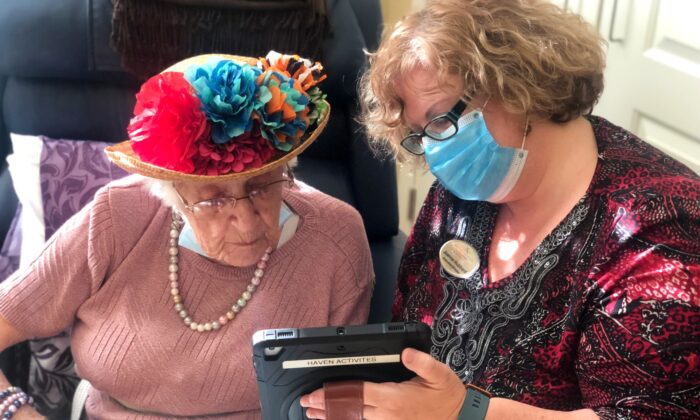Strict Isolation Measures in Place in Northeastern China as Virus Continues to Spread
Seniors have been spending most of their time in their rooms as part of social distancing measures at Kensington Place assisted living community in Redwood City, Calif.
But Kensington staff have found ways to keep residents active and connected—including giving them access to iPads and setting them up on a digital platform called Slack.
Before COVID-19, residents would do daily exercises together. They’d dance, do chair yoga, art therapy, mindfulness exercises, and more.
Now they do these activities in their rooms, but they aren’t necessarily alone. Some of them have family members join them virtually for exercises and other activities.
“Having Slack available, amongst other activities, we have been able to add to their environment, so they are still receiving the same stimulation,” said Greig O’Connor, business director at Kensington Place, via email.
The Kensington team has made sure to engage with residents one-on-one throughout the day, but having their families “visit” virtually also helps keep spirits high.
Slack was an unusual choice for a platform, but a good fit for the home’s needs.
Platform Suited to Those With Dementia
O’Connor saw people using Slack for work—the platform is usually used for businesses to share messages and large files internally. O’Connor envisioned a different use for it at Kensington Place, and it’s since spread to the other Kensington Senior Living communities across California and other states.
Some 500 families are now connected to their elderly loved ones through Slack.
With Slack, updates stay on the page, so there’s no need to be available at the exact same time. Both parties can take videos and photos of episodes in their daily lives and share them at any time, despite time-zone differences or different schedules.
Residents can go back and see the conversations and pictures multiple times. This is helpful for residents exhibiting various forms of dementia, O’Connor said.
They can review the conversations to remember them better and be reminded of where they left off.
“Whether it be a family sharing their day at the farm on the other side of the country, or a family member wishing our resident a family happy birthday from across the world, it has been beautiful to see the engagement amongst one another,” O’Connor said.
“[They] get excited about just showing their families whatever they are enjoying in the moment,” O’Connor said. “Smiles convey it all.”
Residents aren’t all as tech-savvy as their younger relatives, but with some help they’ve gotten onboard.
‘Silver Surfer’
The number of elderly people using the internet has grown at a fast rate in the past several years, making the gap smaller between them and younger generations in this regard.
In the past ten years, the percentage of seniors using the internet has gone from 43 to 73, according to Pew Research. The percentage of young adults using the internet has gone from 92 to 100.
This so-called “silver surfer” trend helped keep seniors more connected even before the pandemic.
The company WayWiser was founded to help facilitate these connections, and it has found the pandemic has made this service more relevant than ever.
WayWiser is helping Kensington implement the technology on a large scale, providing training and set-up of private Slack channels for each resident.
It’s a company that also focuses on helping seniors maintain independence, and it especially works on the issue of elder exploitation.
The elderly are heavily targeted by scams, especially online. One of the most common scams involves fake communications from the Social Security Administration that attempt to steal the seniors’ benefits.
Lindsay Faeder is co-founder of WayWiser, and her father is one of the founding partners of Kensington Senior Living.
“My dad taught me that caring for the older adults living in senior communities is all about honoring what made their lives unique. And a huge part of that is about maintaining connections to those they love,” she said in a WayWiser blog post.
She told The Epoch Times via email, “Connecting to loved ones during this time is more important than ever.”
“One resident and her daughter love gardening, so they share photos back and forth of new blooms,” Faeder said.
Faeder said that a family shared pictures of a new great-grandchild named after their loved one who’s staying at Kensington, bringing tears of joy to the loved one’s eyes.
Karen Kane-Foempe, whose mother lives at Kensington Place, told the WayWiser blog, “This has been a wonderful tool to reassure our family that we are all doing OK.”
“We have my husband in Germany, grandkids in various parts of the state, as well as my sister and I in the area. That’s three generations of family members all connected and able to see my mom happily and actively engaged at The Kensington Place community.”
Focus News: Seniors Home Uses Digital Work Platform to Connect Residents With Family
Taiwan Considers Revoking Hong Kong’s Special Status as Beijing’s National Security Law Looms
